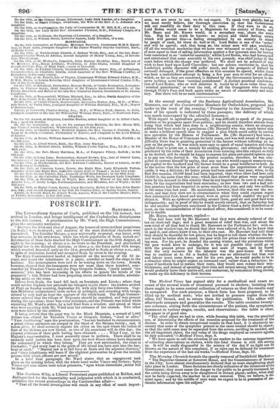At the annual meeting of the Banbury Agricultural Association, Mr.
Harcourt, one of the Conservative Members for Oxfordshire, proposed and spoke on the toast of the evening, "Prosperity to the Association." The tone of his speech is indicated by these passages; the delivery of which was much interrupted by the offended farmers—
With regard to agriculture generally, it was difficult to speak of its present position or its prospects apart from politics; and he should therefore abstain from doing that which had been done in a neighbouring county, where an eloquent address had been made by a gentleman (Mr. Disraeli) who was much better able to make a brilliant speech than to suggest a plan which could safely be carried into operation by the Houses of Parliament. He (Mr. Harcourt) had been a Member of the House of Commons for forty years, and was well aware of the great difficulty there was in granting protection to the farmer without inflicting an in- jury on the people. It was much more easy to speak of equal taxation and cheap capital than to point out a remedy for existing grievances; and although he was precluded by the rules of their Association from entering into this subject so fully as he desired, still he should be happy to express his plain and candid opinion upon it to any one who desired it. On the present occasion, therefore, he was com- pelled to content himself by saying, that any one who would suggest meansto sup- ply capital to the landlord and the farmer would be a great benefactor to both. As to the notion that the low price of meat arose from the importations of foreign cattle, it was a delusion; for better prices had been realized last year, when, in the first five months, 18,000 head had been imported, than when there had been only 10,000 in the same time this year; which fact showed that prices were regulated more by the demand in this country than by any importation. In corn it was other- wise, for the importations had been enormous ; no less than two and a half mil- lion quarters had been imported in seven months this year, and only two millions in the same time last year. He maintained, however, that this was not the mo- ment, and that they were not in circumstances when they could express regret that substantial food, bread and meat, were at prices which enabled the poor to obtain it. With an epidemic prevailing around them, good air and good food were indispensable; and in proof of this he would merely remark, that on Saturday last he and another Magistrate sanctioned in the County Gaol a daily distribution of meat, on the recommendation of the medical officer, who considered it to be essen- tial to health.
Mr. Boyes, tenant farmer, replied— They had been told by M;. Harcourt that they were already relieved of the tax on short-tail dogs; and a great measure of relief that was, and about the suns-total of all they had to thank Mr. Harcourt or the Parliament for: with re- spect to the window-tax, he denied that they were relieved of it, for he knew that he paid it and others knew it too, to their own cost. Mr. Harcourt had told them they should be thankful for low prices, but he forgot to tell them whether the far- mer would be better able to assist the poor with low prices than with remunerat- ing ones. For his part, he dreaded the coming winter, and the privations which the poor would have to undergo; for it was not possible they could go on with the present prices and burdens and scale of wages, and he feared that the only resource for the labourer was the poor-house. If wheat was to continue at 4s. 6cl a bushel, there was no alternative but that rent and labour must come down; and for his own part, he would prefer to be in a situation when he might expect an increased rent, rather than a reduction; be- cause if landlords had to reduce their rents, they would soon reduce their esta- blishments, and instead of spending their time and money among their own people, would probably leave their native soil, and endeavour, by economical living abroad, to make up the deficiency in their income.


























 Previous page
Previous page